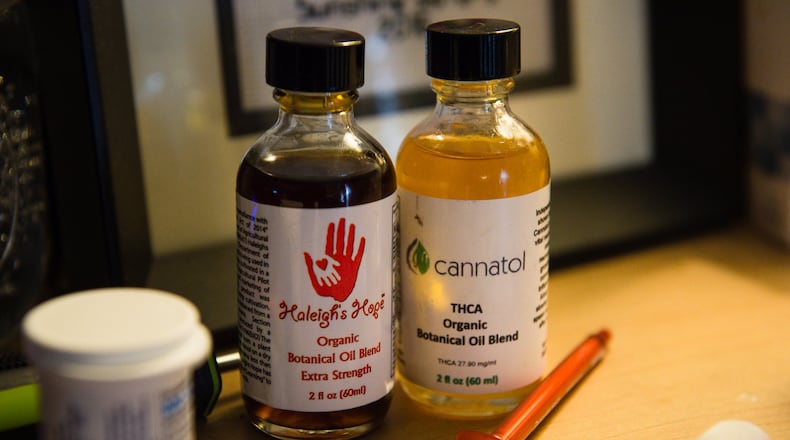ROCK SPRING — Georgia’s medical marijuana board chose six companies Saturday that will be allowed to sell the drug, a decision that will finally give registered patients a legal way to obtain medication first approved six years ago.
The announcement is a long-awaited milestone for about 15,000 patients who have been authorized to use medical marijuana oil since 2015 but weren’t permitted to buy it.
“It’s a blessing. We’re near the end of the tunnel,” said Jessica Reid of Atlanta, whose 4-year-old son, Emmanuel, takes marijuana oil to treat severe seizures. “It’s the only thing I’ve seen that can stop my child’s seizures.”
A packed room of about 200 people watched as the Georgia Access to Medical Cannabis Commission voted unanimously to select the six companies from 69 that had applied for licenses. State law limits the number of medical marijuana producers to six. Each licensee will be authorized to open five dispensaries.
The businesses will be able to sell, grow and manufacture medical marijuana oil, which can have no more than 5% THC, the compound that gives marijuana users a high.
Companies will have one year to begin operations after contracts are signed following potential protests from losing bidders, providing for patients suffering from conditions including seizures, terminal cancers and Parkinson’s disease.
Two companies won licenses to cultivate medical marijuana oil on 100,000 square feet of indoor growing space: Trulieve GA Inc., an affiliate of Florida-based Trulieve Cannabis Corp., and Botanical Sciences LLC, a business located in Glennville in South Georgia.
Four companies will be licensed to operate smaller production facilities with 50,000 square feet of growing room: FFD GA Holdings, TheraTrue Georgia LLC, Natures GA LLC and Treevana Remedy Inc.
The commission scored each business based on criteria set in a state law creating the cannabis oil production program in 2019. Businesses submitted plans for production, business operations, facilities and seed-to-sale tracking. The highest-scoring companies won Georgia’s licenses.
Commissioners said they hope companies will be able to quickly begin operations to provide low THC oil for waiting patients. The winning companies were announced in Rock Spring in northwest Georgia as part of the commission’s commitment to travel across the state and not just focus on metro Atlanta.
“The patients are No. 1 in Georgia. If we can provide them what we need as quickly as we can, that’s what our job is,” said Austell Police Chief Bob Starrett, a member of the commission.
After prolonged debates in the Capitol, a series of bills passed into law and a licensing process that started a year and a half ago, Georgia will soon have a functioning marijuana program. Until now, patients have obtained low THC oil illegally, either through an informal network of patients or by traveling to other states to buy it.
“We are finally at a moment where we can move forward with honoring the next step in this process,” said Judith Rochon, a psychiatrist for Kaiser Permanente Behavioral Health Department and a member of the commission.
When the drug begins to be sold at dispensaries, only registered patients will be allowed to buy it. Patients will be able to obtain medical marijuana oil if they suffer from several conditions described in Georgia law, receive approval from a doctor and apply for a low THC oil registration card from the Georgia Department of Public Health.
The number of medical marijuana producers could grow in the future.
Commission chairman Christopher Edwards, principal surgeon at Atlanta Neurological & Spine Institute, said he will ask the Georgia General Assembly to approve an additional two to four licenses.
State legislators initially limited the number of licenses as part of a compromise between House and Senate leaders who had struggled to strike a balance between providing access to legitimate patients while preventing illegal marijuana distribution.
“The patients of Georgia deserve to have access to a medicine they’re signed up for with the Department of Public Health,” said J’Lyn Furby of American Kinetics, a public relations firm that focuses on compliance in the cannabis industry. “This historic day in the state of Georgia is going to relieve families of the risk to their livelihoods of bringing in medical cannabis oil.”
What happens now?
The next steps in the medical marijuana program will be finalizing contract awards for the six winning companies, then starting operations in the coming months.
About the Author
Keep Reading
The Latest
Featured






